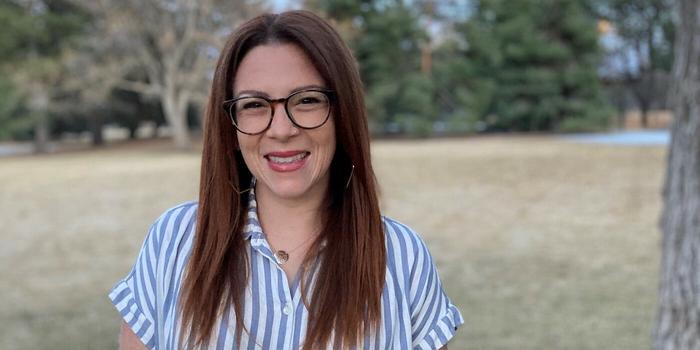
Samantha Rabins always wanted to be in a helping profession without having to sit at a desk all day. As an undergrad, she earned a degree in psychology and considered becoming a doctor. Instead, after graduating with a master’s degree in social work, she landed a job at WellPower as a case manager.
As she progressed in the role, she discovered what she loved about the work. “Rapport-building, crisis management, and working with systems were my strengths,” she says. “And advocating for my clients’ needs and solution-focused techniques were my passion.”
When a co-responder position opened up at WellPower (then the Mental Health Center of Denver) in 2016, she went for it. In this role, Rabins would get to work with local police to determine the best response to people who may be experiencing a mental health issue, brain injury, intellectual disability, or behavior that requires action. “The team prides itself on completing thousands of interventions in both criminal and non-criminal situations, and less than 2% of people we are in contact with are arrested, ticketed, or cited,” she says.
Here, Rabins shares what it’s like working in the male-dominated law enforcement space, how WellPower inspires its employees to be innovative, and her secret to career success.
What are you responsible for in your role?
In my first few weeks as a manager, I was responsible for starting the co-responder program with the Sheriff’s Department and the Fire Department. I coordinate community partnerships within Denver County and other metro area co-responders, finding and creating ongoing training specific to our team’s needs, and developing a more streamlined process for our clinicians to support the people we serve.
Today, I manage 14 people, including co-responders with the Denver Police Department, the Denver Sheriff’s Department, and the Denver Fire Department, as well as our team’s homeless outreach clinician. I oversee the day-to-day tasks of the co-responder team, help plan for future expansion of our team, and work with other cities to discuss their proposals for a co-responder program.
What are the keys to a successful intervention?
Our team utilizes a mixed modality approach to best support someone in a crisis. We are incredibly creative. The co-responders are continuously searching for resources that would best suit someone’s needs and work together to best support someone’s stability. Each person we contact is unique, each situation we encounter is unique, and each crisis someone is experiencing is unique. Rapport, flexibility, and empathy are our three biggest intervention and de-escalation skills. And there is trust in our ability to connect people experiencing a mental health crisis with resources outside of the criminal justice system to provide long-term support.
Our partnership with the Denver Police Department and other first responder agencies has also allowed us to succeed. We all have different specialties, but our shared goal is the same: Assist someone out of a crisis and support them in feeling safe.
What is it like to be a manager working with primarily male law enforcement?
What’s interesting about this question is that social work and counseling tend to be female dominated. We took a female dominated industry and put it right in the center of a male-dominant space and created a successful partnership.
My core values were set in place by my grandmothers and mother. This foundation of persistence and motivation to work for what I have comes from a long line of strong women who gave me the confidence to pursue my passion, period. I was raised by strong women to become a strong woman. Although I am not naïve to the hardships women face in male-dominated industries (and have had my own experiences with them), I am also not one to let my identity as a woman lead me to believe I cannot achieve whatever it is I want to achieve.
What are you working on right now that excites or inspires you?
Right now, we are working on creating more of a standardized training program for our incoming co-responders and more specifically, ongoing training for our current co-responders. This need has come to the forefront as our team has grown and expanded in such a short time. Both co-responders and Denver police officers are participating in developing this project. There aren’t many specific trainings for co-responders and the type of crisis work we do. Training like this would be unique to co-responder programs nationwide and could help co-responders in other cities and states.
What do you like best about the company culture at WellPower?
I’ve been with the organization since 2012, and the one thing that has remained consistent is its desire to be innovative in the field of mental health. This has allowed staff to feel creative and supported in utilizing various therapeutic tools and interventions. In this space, the staff is encouraged to develop innovative ways to help the people we serve. I think allowing our team to have the ability to create and implement new ways of supporting recovery allows staff to be heard and to feel as if they are genuinely part of the change.
What advice do you have for those looking to follow a similar career path as yours?
My first job out of college was in sales, and one of the pillars of success was candor. It was November 2008, and I was struggling. I approached my boss with humility, asking for support. Instead, my boss talked about my inability to perform my job and told me that I never would if I didn’t know what I was doing now. I got laid off a week later.
What I took from this experience wasn’t that I got laid off. It was that I remained an advocate for myself, my need to equally succeed with—and not against—my co-workers, and that being candid will always help propel you into your next career path. Don’t become complacent. Don’t become agreeable to be likable. Be bold. Set goals and set boundaries. Be motivated to push yourself.